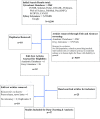Protection of Privacy of Information Rights among Young Adults with Developmental Disabilities
- PMID: 29904325
- PMCID: PMC5986852
- DOI: 10.1007/s11469-018-9904-x
Protection of Privacy of Information Rights among Young Adults with Developmental Disabilities
Abstract
Protection of privacy of information for young adults with developmental disabilities and their families is essential to promote quality of life, well-being, empowerment, and inclusion. Despite this, the young adults' information privacy rights are increasingly at risk. This paper provides a scoping review, applying Arksey and O'Malley's (2005) approach, of all published peer-reviewed journal articles and gray literature to examine the barriers and facilitators in utilization of legislation that protects the collection, use, disclosure, and access of personal information in Canada. The scoping review process was further expanded with a rigorous reliability method and applied a socio-ecological framework to the final 47 studies. National and international policy and legislation (macro level), organization-based factors (meso), young adults and community interactions (exo), and individual disability related factors (micro) are examined. The review identifies the barriers and highlights the importance of facilitators for acting on personal privacy rights.
Keywords: Canada; Confidentiality; Information privacy rights; PHIPA; PIPEDA; Personal information protection.
Conflict of interest statement
Compliance with Ethical StandardsThe authors declare that they have no conflict of interest.
Figures
References
-
- Arksey H, O’Malley L. Scoping studies: towards a methodological framework. Journal of Social Research Methodology. 2005;8:19–32. doi: 10.1080/1364557032000119616. - DOI
-
- Austin L. Is consent the foundation of fair information practices? Canada’s experience under PIPEDA. The University of Toronto Law Journal. 2006;56(2):181–215. doi: 10.1353/tlj.2006.0005. - DOI
-
- Beardwood, J. (2015). The new Canadian digital privacy act: the good, the bad and the ugly. new legislation creates new problems as it fixes others. CRI, 129–134.
-
- Canadian Association for Community Living . Inclusion of Canadians with intellectual disabilities. Toronto: CACL; 2011.
LinkOut - more resources
Full Text Sources
Other Literature Sources


